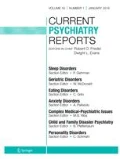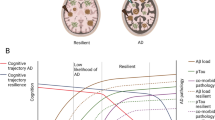Abstract
Cognitive aging describes the changes in mental abilities that occur with increasing age. Although experts disagree on the core underlying processes involved, one factor that links many factors associated with cognitive aging is neuroinflammation. Markers of inflammation are associated directly with deficits in cognitive function and with diseases that are risk factors for cognitive decline. Neuroinflammation is also associated with depression and may account for the complex interaction of depression and cognition in older adults. Interventions that reduce inflammation may improve cognition. Understanding how neuroinflammation affects cognition may provide directions for useful interventions to prevent or treat cognitive decline in older adults.

Similar content being viewed by others
References
Papers of particular interest, published recently, have been highlighted as:•• Of major importance
Park DC: The basic mechanisms accounting for age-related decline in cognitive function. In Cognitive Aging: A Primer. Edited by Park D, Schwarz N. Philadelphia: Taylor & Francis; 2000:3–21.
Cattell RB: Theory of fluid and crystallized intelligence: a critical experiment. J Educ Psychol 1963, 54:1–22.
•• Grady CL: Cognitive neuroscience of aging. Ann N Y Acad Sci 2008, 1124:127–144. Grady provides an excellent review of the current status of research on cognitive aging.
Salthouse TA, Pink JE: Why is working memory related to fluid intelligence? Psychon Bull Rev 2008, 15:364–371.
•• Lindenberger U, Ghisletta P: Cognitive and sensory declines in old age: gauging the evidence for a common cause. Psychol Aging 2009, 24:1–16. This article provides a useful review of current thinking about possible links between changes in both mental and sensory status with increasing age.
Drachman DA: Aging of the brain, entropy, and Alzheimer disease. Neurology 2006, 67:1340–1352.
Yirmiya R, Pollak Y, Morag M, et al.: Illness, cytokines, and depression. Ann N Y Acad Sci 2000, 917:478–487.
Krabbe KS, Reichenberg A, Yirmiya R, et al.: Low-dose endotoxemia and human neuropsychological functions. Brain Behav Immun 2005, 19:453–460.
Capuron L, Ravaud A, Miller AH, Dantzer R: Baseline mood and psychosocial characteristics of patients developing depressive symptoms during interleukin-2 and/or interferon-alpha cancer therapy. Brain Behav Immun 2004, 18:205–213.
Reichenberg A, Yirmiya R, Schuld A, et al.: Cytokine-associated emotional and cognitive disturbances in humans. Arch Gen Psychiatry 2001, 58:445–452.
Lau DC, Dhillon B, Yan H, et al.: Adipokines: molecular links between obesity and atherosclerosis. Am J Physiol Heart Circ Physiol 2005, 288:H2031–H2041.
Gomez CR, Boehmer ED, Kovacs EJ: The aging innate immune system. Curr Opin Immunol 2005, 17:457–462.
Hawkley LC, Cacioppo JT: Stress and the aging immune system. Brain Behav Immun 2004, 18:114–119.
Arimoto T, Choi DY, Lu X, et al.: Interleukin-10 protects against inflammation-mediated degeneration of dopaminergic neurons in substantia nigra. Neurobiol Aging 2007, 28:894–906.
Kuo HK, Yen CJ, Chang CH, et al.: Relation of C-reactive protein to stroke, cognitive disorders, and depression in the general population: systematic review and meta-analysis. Lancet Neurol 2005, 4:371–380.
•• Gimeno D, Kivimaki M, Brunner EJ, et al.: Associations of C-reactive protein and interleukin-6 with cognitive symptoms of depression: 12-year follow-up of the Whitehall II study. Psychol Med 2009, 39:413–423. This article definitively links CRP and IL-6 with depression in a well-known longitudinal study.
Stampfer MJ: Cardiovascular disease and Alzheimer’s disease: common links. J Intern Med 2006, 260:211–223.
Helzner EP, Luchsinger JA, Scarmeas N, et al.: Contribution of vascular risk factors to the progression in Alzheimer disease. Arch Neurol 2009, 66:343–348.
Li G, Cherrier MM, Tsuang DW, et al.: Salivary cortisol and memory function in human aging. Neurobiol Aging 2006, 27:1705–1714.
Lupien SJ, Lepage M: Stress, memory, and the hippocampus: can’t live with it, can’t live without it. Behav Brain Res 2001, 127:137–158.
Goshen I, Yirmiya R: Interleukin-1 (IL-1): a central regulator of stress responses. Front Neuroendocrinol 2009, 30:30–45.
Fried LP, Tangen CM, Walston J, et al.: Frailty in older adults: evidence for a phenotype. J Gerontol A Biol Sci Med Sci 2001, 56:M146–M156.
Bergman H, Ferrucci L, Guralnik J, et al.: Frailty: an emerging research and clinical paradigm issues and controversies. J Gerontol A Biol Sci Med Sci 2007, 62:731–737.
Barzilay JI, Blaum C, Moore T, et al.: Insulin resistance and inflammation as precursors of frailty: the Cardiovascular Health Study. Arch Intern Med 2007, 167:635–641.
Buchman AS, Schneider JA, Leurgans S, Bennett DA: Physical frailty in older persons is associated with Alzheimer disease pathology. Neurology 2008, 71:499–504.
Hunter RL, Cheng B, Choi DY, et al.: Intrastriatal lipopolysaccharide injection induces parkinsonism in C57/B6 mice. J Neurosci Res 2009, 87:1913–1921.
Long-Smith CM, Sullivan AM, Nolan YM: The influence of microglia on the pathogenesis of Parkinson’s disease. Prog Neurobiol 2009 Aug 15 (Epub ahead of print).
Backman L, Nyberg L, Lindenberger U, et al.: The correlative triad among aging, dopamine, and cognition: current status and future prospects. Neurosci Biobehav Rev 2006, 30:791–807.
Beydoun MA, Beydoun HA, Wang Y: Obesity and central obesity as risk factors for incident dementia and its subtypes: a systematic review and meta-analysis. Obes Rev 2008, 9:204–218.
Sweat V, Starr V, Bruehl H, et al.: C-reactive protein is linked to lower cognitive performance in overweight and obese women. Inflammation 2008, 31:198–207.
Penninx BW, Nicklas BJ, Newman AB, et al.: Metabolic syndrome and physical decline in older persons: results from the Health, Aging and Body Composition Study. J Gerontol A Biol Sci Med Sci 2009, 64:96–102.
Vogelzangs N, Beekman AT, Dik MG, et al.: Late-life depression, cortisol, and the metabolic syndrome. Am J Geriatr Psychiatry 2009, 17:716–721.
Yaffe K, Weston AL, Blackwell T, Krueger KA: The metabolic syndrome and development of cognitive impairment among older women. Arch Neurol 2009, 66:324–328.
Craft S: The role of metabolic disorders in Alzheimer disease and vascular dementia: two roads converged. Arch Neurol 2009, 66:300–305.
Roriz-Filho S, Sa-Roriz TM, Rosset I, et al.: (Pre)diabetes, brain aging, and cognition. Biochim Biophys Acta 2009, 1792:432–443.
Dik MG, Jonker C, Comijs HC, et al.: Contribution of metabolic syndrome components to cognition in older individuals. Diabetes Care 2007, 30:2655–2660.
Segura B, Jurado MA, Freixenet N, et al.: Mental slowness and executive dysfunctions in patients with metabolic syndrome. Neurosci Lett 2009, 462:49–53.
Capuron L, Su S, Miller AH, et al.: Depressive symptoms and metabolic syndrome: is inflammation the underlying link? Biol Psychiatry 2008, 64:896–900.
Ladwig KH, Marten-Mittag B, Lowel H, et al.: C-reactive protein, depressed mood, and the prediction of coronary heart disease in initially healthy men: results from the MONICA-KORA Augsburg Cohort Study 1984–1998. Eur Heart J 2005, 26:2537–2542.
Martinowich K, Manji H, Lu B: New insights into BDNF function in depression and anxiety. Nat Neurosci 2007, 10:1089–1093.
Arentoft A, Sweat V, Starr V, et al.: Plasma BDNF is reduced among middle-aged and elderly women with impaired insulin function: evidence of a compensatory mechanism. Brain Cogn 2009, 71:147–152.
Li G, Peskind ER, Millard SP, et al.: Cerebrospinal fluid concentration of brain-derived neurotrophic factor and cognitive function in non-demented subjects. PLoS One 2009, 4:e5424.
Gomez-Pinilla F, Vaynman S, Ying Z: Brain-derived neurotrophic factor functions as a metabotrophin to mediate the effects of exercise on cognition. Eur J Neurosci 2008, 28:2278–2287.
Venneri A, Lane R: Effects of cholinesterase inhibition on brain white matter volume in Alzheimer’s disease. Neuroreport 2009, 20:285–288.
Tracey KJ: Physiology and immunology of the cholinergic antiinflammatory pathway. J Clin Invest 2007, 117:289–296.
ADAPT Research Group: Naproxen and celecoxib do not prevent AD in early results from a randomized controlled trial. Neurology 2007, 68:1800–1808.
Vlad SC, Miller DR, Kowall NW, Felson DT: Protective effects of NSAIDs on the development of Alzheimer disease. Neurology 2008, 70:1672–1677.
Szekely CA, Breitner JC, Fitzpatrick AL, et al.: NSAID use and dementia risk in the Cardiovascular Health Study: role of APOE and NSAID type. Neurology 2008, 70:17–24.
Kris-Etherton PM, Harris WS, Appel LJ; Nutrition Committee: Fish consumption, fish oil, omega-3 fatty acids, and cardiovascular disease. Arterioscler Thromb Vasc Biol 2003, 23:e20–e30. (Published erratum appears in Arterioscler Thromb Vasc Biol 2003, 23:e31.)
Morris MC, Evans DA, Bienias JL, et al.: Consumption of fish and n-3 fatty acids and risk of incident Alzheimer disease. Arch Neurol 2003, 60:940–946.
Fotuhi M, Mohassel P, Yaffe K: Fish consumption, long-chain omega-3 fatty acids and risk of cognitive decline or Alzheimer disease: a complex association. Nat Clin Pract Neurol 2009, 5:140–152.
Freund-Levi Y, Eriksdotter-Jonhagen M, Cederholm T, et al.: Omega-3 fatty acid treatment in 174 patients with mild to moderate Alzheimer disease: OmegAD Study: a randomized double-blind trial. Arch Neurol 2006, 63:1402–1408.
Wolozin B, Wang SW, Li NC, et al.: Simvastatin is associated with a reduced incidence of dementia and Parkinson’s disease. BMC Med 2007, 5:20.
Li G, Larson EB, Sonnen JA, et al.: Statin therapy is associated with reduced neuropathologic changes of Alzheimer disease. Neurology 2007, 69:878–885.
Solomon A, Kareholt I, Ngandu T, et al.: Serum total cholesterol, statins and cognition in non-demented elderly. Neurobiol Aging 2009, 30:1006–1009.
Petersen AM, Pedersen BK: The anti-inflammatory effect of exercise. J Appl Physiol 2005, 98:1154–1162.
Ownby RL, Loewenstein DA, Kumar M: Anti-inflammatory effects mediate the relation between physical activity and mood in older adults. Paper presented at the Annual Meeting of the International Society of Psychoneuroendocrinology. San Francisco, CA; August 2009.
•• Cotman CW, Berchtold NC, Christie LA: Exercise builds brain health: key roles of growth factor cascades and inflammation. Trends Neurosci 2007, 30:464–472. This is an excellent review of the possible links between exercise and cognitive function by way of inflammatory processes.
Colcombe S, Kramer AF: Fitness effects on the cognitive function of older adults: a meta-analytic study. Psychol Sci 2003, 14:125–130.
Willis SL, Tennstedt SL, Marsiske M, et al.: Long-term effects of cognitive training on everyday functional outcomes in older adults. JAMA 2006, 296:2805–2814.
•• Jaeggi SM, Buschkuehl M, Jonides J, Perrig WJ: Improving fluid intelligence with training on working memory. Proc Natl Acad Sci U S A 2008, 105:6829–6833. This article reports the exciting finding that training in one cognitive domain may have positive effects in another.
•• McNab F, Varrone A, Farde L, et al.: Changes in cortical dopamine D1 receptor binding associated with cognitive training. Science 2009, 323:800–802. This study shows that working memory training may have effects on D 1 -receptor density in areas relevant to working memory function, providing a possible mechanism for the observation by Jaeggi et al. [61••] that working memory training may improve other aspects of cognitive function.
Buschkuehl M, Jaeggi SM, Hutchison S, et al.: Impact of working memory training on memory performance in old-old adults. Psychol Aging 2008, 23:743–753.
Disclosure
Dr. Ownby has served on advisory boards and speaker panels for Forest Pharmaceuticals, Janssen, and Pfizer and has received grant support from Janssen.
Author information
Authors and Affiliations
Corresponding author
Rights and permissions
About this article
Cite this article
Ownby, R.L. Neuroinflammation and Cognitive Aging. Curr Psychiatry Rep 12, 39–45 (2010). https://doi.org/10.1007/s11920-009-0082-1
Published:
Issue Date:
DOI: https://doi.org/10.1007/s11920-009-0082-1




